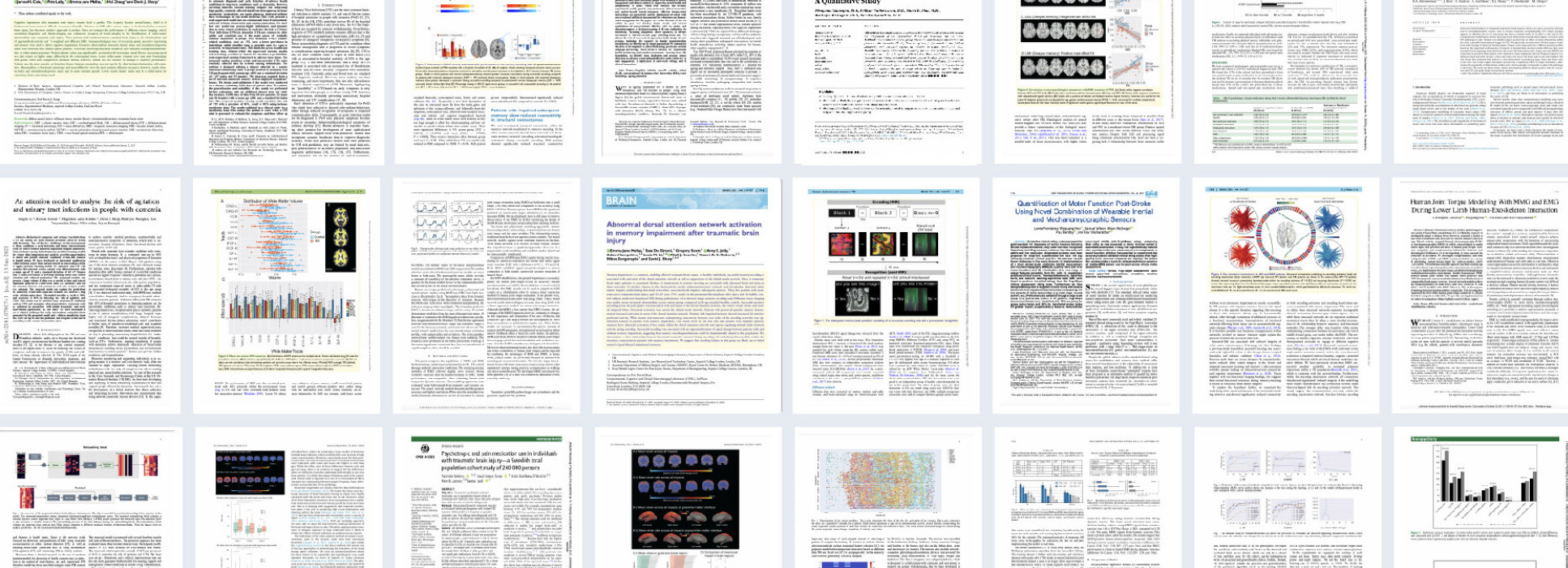
Results
- Showing results for:
- Reset all filters
Search results
-
Journal articleDavid MCB, Kolanko M, Del Giovane M, et al., 2023,
Remote monitoring of physiology in people living with dementia: an observational cohort study
, JMIR Aging, Vol: 6, Pages: 1-14, ISSN: 2561-7605BACKGROUND: Internet of Things (IoT) technology enables physiological measurements to be recorded at home from people living with dementia and monitored remotely. However, measurements from people with dementia in this context have not been previously studied. We report on the distribution of physiological measurements from 82 people with dementia over approximately 2 years. OBJECTIVE: Our objective was to characterize the physiology of people with dementia when measured in the context of their own homes. We also wanted to explore the possible use of an alerts-based system for detecting health deterioration and discuss the potential applications and limitations of this kind of system. METHODS: We performed a longitudinal community-based cohort study of people with dementia using "Minder," our IoT remote monitoring platform. All people with dementia received a blood pressure machine for systolic and diastolic blood pressure, a pulse oximeter measuring oxygen saturation and heart rate, body weight scales, and a thermometer, and were asked to use each device once a day at any time. Timings, distributions, and abnormalities in measurements were examined, including the rate of significant abnormalities ("alerts") defined by various standardized criteria. We used our own study criteria for alerts and compared them with the National Early Warning Score 2 criteria. RESULTS: A total of 82 people with dementia, with a mean age of 80.4 (SD 7.8) years, recorded 147,203 measurements over 958,000 participant-hours. The median percentage of days when any participant took any measurements (ie, any device) was 56.2% (IQR 33.2%-83.7%, range 2.3%-100%). Reassuringly, engagement of people with dementia with the system did not wane with time, reflected in there being no change in the weekly number of measurements with respect to time (1-sample t-test on slopes of linear fit, P=.45). A total of 45% of people with dementia met criteria for hypertension. People with dem
-
Conference paperSerban AI, Lai H, Daniels S, et al., 2023,
Identifying Household Fingerprint Using Intelligent Passive Monitoring for People Living with Dementia
, Pages: 1218-1223Monitoring and supporting daily routines in households with dementia is highly important. Here we analyse daily activity in 104 households with dementia across 24 months using passive motion sensors, door sensors and bed mat. We use Markov chain to extract the transitions around the house and we compare these transitions over time. We found that transitions around the house can be used to uniquely match the household as a distinctive fingerprint. We observed that the fingerprint of single-occupancy households is stronger than multiple occupancy and that predicting consecutive periods of time has a higher accuracy due to less change in routine. We focused the latter part of our study on the single occupancy households, specifically looking at the impact of the house floorplan. We observed that despite having similar or identical floorplans, the household fingerprint is still unique and related to the level of activity, and routine.
-
Journal articleFletcher-Lloyd N, Serban A-I, Kolanko M, et al., 2023,
A Markov chain model for identifying changes in daily activity patterns of people living with dementia
, IEEE Internet of Things Journal, ISSN: 2327-4662Malnutrition and dehydration are strongly associated with increased cognitive and functional decline in people living with dementia (PLWD), as well as an increased rate of hospitalisations in comparison to their healthy counterparts. Extreme changes in eating and drinking behaviours can often lead to malnutrition and dehydration, accelerating the progression of cognitive and functional decline and resulting in a marked reduction in quality of life. Unfortunately, there are currently no established methods by which to objectively detect such changes. Here, we present the findings of an extensive quantitative analysis conducted on in-home monitoring data collected from 73 households of PLWD using Internet of Things technologies. The Coronavirus 2019 (COVID-19) pandemic has previously been shown to have dramatically altered the behavioural habits, particularly the eating and drinking habits, of PLWD. Using the COVID-19 pandemic as a natural experiment, we conducted linear mixed-effects modelling to examine changes in mean kitchen activity within a subset of 21 households of PLWD that were continuously monitored for 499 days. We report an observable increase in day-time kitchen activity and a significant decrease in night-time kitchen activity (t(147) = -2.90, p < 0.001). We further propose a novel analytical approach to detecting changes in behaviours of PLWD using Markov modelling applied to remote monitoring data as a proxy for behaviours that cannot be directly measured. Together, these results pave the way to introduce improvements into the monitoring of PLWD in naturalistic settings and for shifting from reactive to proactive care.
-
Journal articleSeah CEL, Zhang Z, Sun S, et al., 2022,
Designing mindfulness conversational agents for people with early-stage dementia and their caregivers: thematic analysis of expert and user perspectives
, JMIR Aging, Vol: 5, Pages: e40360-e40360, ISSN: 2561-7605BACKGROUND: The number of people with dementia is expected to grow worldwide. Among the ways to support both persons with early-stage dementia and their caregivers (dyads), researchers are studying mindfulness interventions. However, few studies have explored technology-enhanced mindfulness interventions for dyads and the needs of persons with dementia and their caregivers. OBJECTIVE: The main aim of this study was to elicit essential needs from people with dementia, their caregivers, dementia experts, and mindfulness experts to identify themes that can be used in the design of mindfulness conversational agents for dyads. METHODS: Semistructured interviews were conducted with 5 dementia experts, 5 mindfulness experts, 5 people with early-stage dementia, and 5 dementia caregivers. Interviews were transcribed and coded on NVivo (QSR International) before themes were identified through a bottom-up inductive approach. RESULTS: The results revealed that dyadic mindfulness is preferred and that implementation formats such as conversational agents have potential. A total of 5 common themes were also identified from expert and user feedback, which should be used to design mindfulness conversational agents for persons with dementia and their caregivers. The 5 themes included enhancing accessibility, cultivating positivity, providing simplified tangible and thought-based activities, encouraging a mindful mindset shift, and enhancing relationships. CONCLUSIONS: In essence, this research concluded with 5 themes that mindfulness conversational agents could be designed based on to meet the needs of persons with dementia and their caregivers.
-
Journal articleLima MR, Wairagkar M, Gupta M, et al., 2022,
Conversational affective social robots for ageing and dementia support
, IEEE Transactions on Cognitive and Developmental Systems, Vol: 14, Pages: 1378-1397, ISSN: 2379-8920Socially assistive robots (SAR) hold significant potential to assist older adults and people with dementia in human engagement and clinical contexts by supporting mental health and independence at home. While SAR research has recently experienced prolific growth, long-term trust, clinical translation and patient benefit remain immature. Affective human-robot interactions are unresolved and the deployment of robots with conversational abilities is fundamental for robustness and humanrobot engagement. In this paper, we review the state of the art within the past two decades, design trends, and current applications of conversational affective SAR for ageing and dementia support. A horizon scanning of AI voice technology for healthcare, including ubiquitous smart speakers, is further introduced to address current gaps inhibiting home use. We discuss the role of user-centred approaches in the design of voice systems, including the capacity to handle communication breakdowns for effective use by target populations. We summarise the state of development in interactions using speech and natural language processing, which forms a baseline for longitudinal health monitoring and cognitive assessment. Drawing from this foundation, we identify open challenges and propose future directions to advance conversational affective social robots for: 1) user engagement, 2) deployment in real-world settings, and 3) clinical translation.
This data is extracted from the Web of Science and reproduced under a licence from Thomson Reuters. You may not copy or re-distribute this data in whole or in part without the written consent of the Science business of Thomson Reuters.
Awards
- Finalist: Best Paper - IEEE Transactions on Mechatronics (awarded June 2021)
- Finalist: IEEE Transactions on Mechatronics; 1 of 5 finalists for Best Paper in Journal
- Winner: UK Institute of Mechanical Engineers (IMECHE) Healthcare Technologies Early Career Award (awarded June 2021): Awarded to Maria Lima (UKDRI CR&T PhD candidate)
- Winner: Sony Start-up Acceleration Program (awarded May 2021): Spinout company Serg Tech awarded (1 of 4 companies in all of Europe) a place in Sony corporation start-up boot camp
- “An Extended Complementary Filter for Full-Body MARG Orientation Estimation” (CR&T authors: S Wilson, R Vaidyanathan)

Established in 2017 by its principal funder the Medical Research Council, in partnership with Alzheimer's Society and Alzheimer’s Research UK, The UK Dementia Research Institute (UK DRI) is the UK’s leading biomedical research institute dedicated to neurodegenerative diseases.


